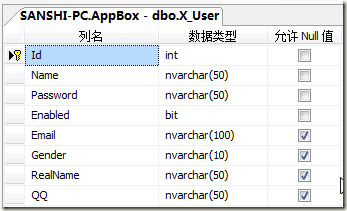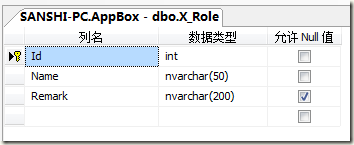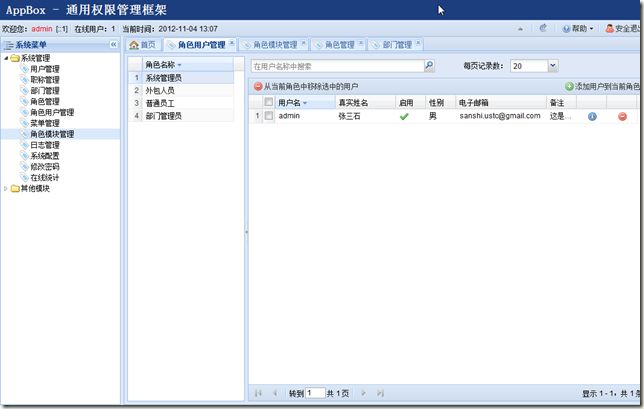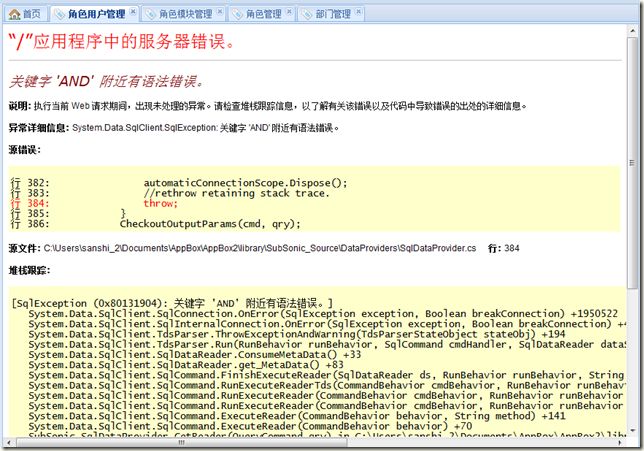修正SubSonic v2.2.1的一处BUG,以及如何使用SubSonic进行多表查询、子查询以及数据库分页
相信很多同学都用过SubSonic,在07 - 10年ORM兴起的时代,SubSonic可以说是DotNet开发人员的救星。虽说现在 EntityFramework大有一统江湖的趋势,不过在DotNet2.0框架下,SubSonic依然是为数不多的选择。
最近在维护基于 ExtAspNet 的通用权限管理项目 AppBox ,在使用SubSonic进行多表查询和数据库分页时遇到了点问题,下面我会详细分享这一经过,以及如何通过修改SubSonic的源代码来修正这一问题。
我要实现如下的功能
我要实现的功能非常简单:用户管理,角色管理,角色用户管理(一个用户可以属于多个角色)。相信很多同学闭着眼睛就能把数据库给构造出来,不是吗?
1. 用户表
2. 角色表
3. 角色用户表
其中用户管理和角色管理都很简单,我要实现的角色用户管理界面如下所示:
1. 查看角色下的所有用户
2. 向角色添加现有用户
数据库查询时遇到问题
在查看角色下的所有用户页面,需要进行表关联,相关的SubSonic代码如下所示:
1: // 查询 X_User 表
2: SqlQuery q = new Select().From<XUser>();
3: q.Where("1").IsEqualTo("1");
4:
5: // 在用户名称中搜索
6: string searchText = ttbSearchUser.Text.Trim();
7: if (!String.IsNullOrEmpty(searchText))
8: {
9: q.And(XUser.NameColumn).ContainsString(searchText);
10: }
11:
12: // 过滤选中角色下的所有用户
13: object[] values = Grid1.DataKeys[Grid1.SelectedRowIndexArray[0]];
14: int roleId = Convert.ToInt32(values[0]);
15: SqlQuery subQ = new Select(XRoleUser.UserIdColumn).From<XRoleUser>().Where(XRoleUser.RoleIdColumn).IsEqualTo(roleId);
16:
17: q.And(XUser.IdColumn).In(subQ);
18:
19:
20: // 在查询添加之后,排序和分页之前获取总记录数
21: // Grid1总共有多少条记录
22: Grid2.RecordCount = q.GetRecordCount();
23:
24: // 排列
25: q.OrderBys.Add(GetSortExpression(Grid2, XUser.Schema));
26:
27: // 数据库分页
28: q.Paged(Grid2.PageIndex + 1, Grid2.PageSize);
29: items = q.ExecuteAsCollection<XUserCollection>();
令人不解的时,居然报如下错误:
很明显,SubSonic生成的SQL脚本不对,经过调试发现生成的脚本如下所示:
1: DECLARE @Page int
2: DECLARE @PageSize int
3:
4: SET @Page = 1
5: SET @PageSize = 20
6:
7: SET NOCOUNT ON
8:
9: -- create a temp table to hold order ids
10: DECLARE @TempTable TABLE (IndexId int identity, _keyID Int)
11:
12: -- insert the table ids and row numbers into the memory table
13: INSERT INTO @TempTable
14: (
15: _keyID
16: )
17: SELECT [dbo].[X_User].[Id]
18: FROM [dbo].[X_User]
19: WHERE 1 = @10
20: AND [dbo].[X_User].[Id] IN (SELECT [dbo].[X_RoleUser].[UserId]
21: FROM [dbo].[X_RoleUser]
22: WHERE [dbo].[X_RoleUser].[RoleId] = @RoleId0
23: )
24:
25: AND 1 = @10
26: AND [dbo].[X_User].[Id] IN (SELECT [dbo].[X_RoleUser].[UserId]
27: FROM [dbo].[X_RoleUser]
28: AND [dbo].[X_RoleUser].[RoleId] = @RoleId0
29: )
30:
31: ORDER BY Name DESC
32:
33: -- select only those rows belonging to the proper page
34: SELECT [dbo].[X_User].[Id], [dbo].[X_User].[Name], [dbo].[X_User].[Password], [dbo].[X_User].[Enabled], [dbo].[X_User].[Email], [dbo].[X_User].[Gender], [dbo].[X_User].[RealName], [dbo].[X_User].[QQ], [dbo].[X_User].[MSN], [dbo].[X_User].[CellPhone], [dbo].[X_User].[OfficePhone], [dbo].[X_User].[HomePhone], [dbo].[X_User].[Remark], [dbo].[X_User].[DeptId], [dbo].[X_User].[RoleId], [dbo].[X_User].[CreateTime]
35:
36: FROM [dbo].[X_User]
37: INNER JOIN [dbo].[X_RoleUser] ON [dbo].[X_User].[Id] = [dbo].[X_RoleUser].[UserId]
38:
39: INNER JOIN @TempTable t ON [dbo].[X_User].[Id] = t._keyID
40: WHERE t.IndexId BETWEEN ((@Page - 1) * @PageSize + 1) AND (@Page * @PageSize)
这里面有两处错误:
1. 首先,25 – 29 行的Where子句重复了,相信这个问题一直存在于SubSonic2.2中,只不过大家都没发现而已
2. 其次,重复的子查询中Where被替换成了AND,导致这个子查询没有Where子句,从而报错!
如果撇去分页的SQL脚本不管,正确的SQL脚本应该是这样的:
1: SELECT [dbo].[X_User].[Id]
2: FROM [dbo].[X_User]
3: WHERE 1 = @10
4: AND [dbo].[X_User].[Id] IN (SELECT [dbo].[X_RoleUser].[UserId]
5: FROM [dbo].[X_RoleUser]
6: WHERE [dbo].[X_RoleUser].[RoleId] = @RoleId0
7: )
8:
9: ORDER BYName DESC
很明显,SubSonic在生成带子查询的分页SQL脚本时除了问题。
修改SubSonic的源代码
从Github下载SubSonic2.0的源代码:https://nodeload.github.com/subsonic/SubSonic-2.0/zip/master
其实下载下来的是SubSonic2.2.1,找到其中的 SqlQuery\SqlGenerators\ANSISqlGenerator.cs 文件:
1:
2: public virtual string BuildPagedSelectStatement()
3: {
4: // 省略的代码...
5:
6: string wheres = GenerateWhere();
7:
8: //have to doctor the wheres, since we're using a WHERE in the paging
9: //bits. So change all "WHERE" to "AND"
10: string tweakedWheres = wheres.Replace("WHERE", "AND");
11:
12: // 省略的代码...
13:
14: string sql = string.Format(PAGING_SQL, idColumn, String.Concat(fromLine, joins, wheres), String.Concat(tweakedWheres, orderby, havings),
15: String.Concat(select, fromLine, joins), query.CurrentPage, query.PageSize, sqlType);
16: return sql;
17: }
其中 tweakedWheres 是关键,作者还特别指出要把其中 WHERE 替换成 AND,殊不知这样做对子查询是破坏性操作,而且下面连接SQL脚本时重复添加了WHERE子句。
修改后的代码:
1:
2: public virtual string BuildPagedSelectStatement()
3: {
4: // 省略的代码...
5:
6: string wheres = GenerateWhere();
7:
8: //have to doctor the wheres, since we're using a WHERE in the paging
9: //bits. So change all "WHERE" to "AND"
10: //string tweakedWheres = wheres.Replace("WHERE", "AND");
11:
12: // 省略的代码...
13:
14: string sql = string.Format(PAGING_SQL, idColumn, String.Concat(fromLine, joins, wheres), String.Concat(orderby, havings),
15: String.Concat(select, fromLine, joins), query.CurrentPage, query.PageSize, sqlType);
16: return sql;
17: }
搞定!
子查询与表关联查询(查看角色下所有用户)
在上面的例子中,我们使用的是子查询,对于“查看角色下所有用户”这个案例,我们还有如下另一种解决办法(效果完全一样):
1: // 查询 X_User 表
2: SqlQuery q = new Select().From<XUser>().InnerJoin(XRoleUser.UserIdColumn, XUser.IdColumn);
3: q.Where("1").IsEqualTo("1");
4:
5: // 在用户名称中搜索
6: string searchText = ttbSearchUser.Text.Trim();
7: if (!String.IsNullOrEmpty(searchText))
8: {
9: q.And(XUser.NameColumn).ContainsString(searchText);
10: }
11:
12: // 过滤选中角色下的所有用户
13: object[] values = Grid1.DataKeys[Grid1.SelectedRowIndexArray[0]];
14: int roleId = Convert.ToInt32(values[0]);
15: q.And(XRoleUser.RoleIdColumn).IsEqualTo(roleId);
16:
17:
18: // 在查询添加之后,排序和分页之前获取总记录数
19: // Grid1总共有多少条记录
20: Grid2.RecordCount = q.GetRecordCount();
21:
22: // 排列
23: q.OrderBys.Add(GetSortExpression(Grid2, XUser.Schema));
24:
25: // 数据库分页
26: q.Paged(Grid2.PageIndex + 1, Grid2.PageSize);
27: items = q.ExecuteAsCollection<XUserCollection>();
再来看下这段代码生成的SQL脚本(修正SubSonic2.2.1中的BUG后):
1: DECLARE @Page int
2: DECLARE @PageSize int
3:
4: SET @Page = 1
5: SET @PageSize = 20
6:
7: SET NOCOUNT ON
8:
9: -- create a temp table to hold order ids
10: DECLARE @TempTable TABLE (IndexId int identity, _keyID Int)
11:
12: -- insert the table ids and row numbers into the memory table
13: INSERT INTO @TempTable
14: (
15: _keyID
16: )
17: SELECT [dbo].[X_User].[Id]
18: FROM [dbo].[X_User]
19: INNER JOIN [dbo].[X_RoleUser] ON [dbo].[X_User].[Id] = [dbo].[X_RoleUser].[UserId]
20: WHERE 1 = @10
21: AND [dbo].[X_RoleUser].[RoleId] = @RoleId1
22:
23: ORDER BY Name DESC
24:
25: -- select only those rows belonging to the proper page
26: SELECT [dbo].[X_User].[Id], [dbo].[X_User].[Name], [dbo].[X_User].[Password], [dbo].[X_User].[Enabled], [dbo].[X_User].[Email], [dbo].[X_User].[Gender], [dbo].[X_User].[RealName], [dbo].[X_User].[QQ], [dbo].[X_User].[MSN], [dbo].[X_User].[CellPhone], [dbo].[X_User].[OfficePhone], [dbo].[X_User].[HomePhone], [dbo].[X_User].[Remark], [dbo].[X_User].[DeptId], [dbo].[X_User].[RoleId], [dbo].[X_User].[CreateTime]
27:
28: FROM [dbo].[X_User]
29: INNER JOIN [dbo].[X_RoleUser] ON [dbo].[X_User].[Id] = [dbo].[X_RoleUser].[UserId]
30:
31: INNER JOIN @TempTable t ON [dbo].[X_User].[Id] = t._keyID
32: WHERE t.IndexId BETWEEN ((@Page - 1) * @PageSize + 1) AND (@Page * @PageSize)
向当前角色添加现有用户
对于这个情况,我们要注意一点,就是供选择的现有用户不应当包括哪些已经属于当前角色的用户,可以用子查询来实现:
1: SqlQuery q = new Select().From<XUser>(); //.LeftOuterJoin(XRoleUser.UserIdColumn, XUser.IdColumn);
2: q.Where("1").IsEqualTo("1");
3:
4: // 在职务名称中搜索
5: string searchText = ttbSearchMessage.Text.Trim();
6: if (!String.IsNullOrEmpty(searchText))
7: {
8: q.And(XUser.NameColumn).ContainsString(searchText);
9: }
10:
11: // 排除已经属于本角色的用户
12: int currentRoleId = GetQueryIntValue("id");
13: SqlQuery subQ = new Select(XRoleUser.UserIdColumn).From<XRoleUser>().Where(XRoleUser.RoleIdColumn).IsEqualTo(currentRoleId);
14:
15: q.And(XUser.IdColumn).NotIn(subQ);
16: //q.And(XUser.IdColumn).IsNotEqualTo(1);
17:
18: // 只列出不在当前角色中的用户
19: //q.AndExpression(XUser.RoleIdColumn.ColumnName).IsNotEqualTo(GetQueryIntValue("id")).Or(XUser.RoleIdColumn).IsNull().CloseExpression();
20:
21: // 在查询添加之后,排序和分页之前获取总记录数
22: // Grid1总共有多少条记录
23: Grid1.RecordCount = q.GetRecordCount();
24:
25: // 排列
26: q.OrderBys.Add(GetSortExpression(Grid1, XUser.Schema));
27:
28: // 数据库分页
29: q.Paged(Grid1.PageIndex + 1, Grid1.PageSize);
30: XUserCollection items = q.ExecuteAsCollection<XUserCollection>();
小结
虽然SubSonic2.2的代码已经不更新了,但是在实际应用中,我们可以恰当的修正其源代码来满足需求,这也归功于开源的力量。同时也希望大家能多关注同样是完全开源的ExtAspNet(基于ExtJS的专业ASP.NET2.0控件库)。
注:AppBox是捐赠软件,也就是说你可以通过捐赠作者来获得AppBox源代码。





